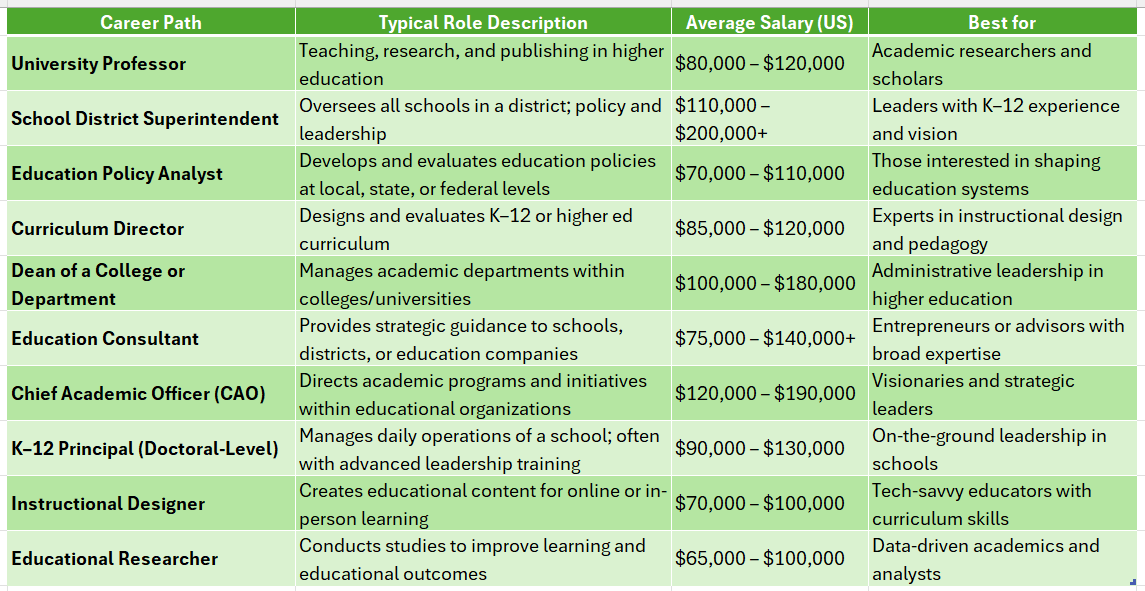When considering a career in education, many wonder, “What jobs for doctorate in education?” This question is crucial because a doctorate can open doors to advanced roles that shape the future of learning. With a doctorate, you can influence educational policies, lead innovative programs, and even teach at the university level.
High-Level Positions in Education
A doctorate in education can lead to various high-level positions, including:
- University Professor: Teach future educators and conduct research.
- Educational Administrator: Oversee school districts or educational institutions.
- Curriculum Developer: Design educational programs and materials.
These roles often require a deep understanding of educational theories and practices, making a doctorate essential.
Specialized Roles
Additionally, there are specialized jobs for doctorate in education, such as:
- Educational Consultant: Advise schools on best practices.
- Policy Analyst: Research and influence educational policies.
- Director of Educational Technology: Manage online doctoral degrees in educational technology and integrate tech into learning.
These positions not only require advanced knowledge but also a passion for improving education.
Contact Now to Pursue Your Dream Degree From Your Nearest College
Top Career Paths for Doctorate Holders in Education

When considering a career in education, many wonder, “What jobs require a doctorate in education?” This question is crucial because a doctorate opens doors to advanced roles that can significantly impact the educational landscape. Whether you’re passionate about teaching, administration, or research, a doctorate can elevate your career.
Leadership Roles
- University Professor: Teaching at the college level, guiding future educators.
- Educational Administrator: Overseeing schools or districts, shaping policies and programs.
Research Opportunities
- Educational Researcher: Conducting studies to improve teaching methods and learning outcomes.
- Post Doctoral in Education: Engaging in advanced research projects, contributing to academic knowledge.
Specialized Fields
- Curriculum Developer: Designing innovative educational programs and materials.
- Consultant: Advising schools on best practices and educational technologies, including those from online doctoral degrees in educational technology.
Each of these paths offers unique opportunities to make a difference in education. With jobs for doctorate in education, you can influence how students learn and grow. So, if you’re considering this journey, know that your efforts can lead to rewarding and impactful careers!
Is a Doctorate in Education Worth It for Your Career?
When considering a Doctorate in Education, it’s essential to understand the career opportunities it opens up. Many people wonder, “What jobs require a doctorate in education?” This degree can lead to exciting roles that shape the future of education, making it a worthwhile investment for your career.
Career Opportunities
With a doctorate in education, you can explore various jobs, including:
- University Professor: Teach and mentor future educators.
- Educational Administrator: Lead schools or districts, making impactful decisions.
- Curriculum Developer: Design educational programs that enhance learning.
- Researcher: Conduct studies that influence educational policies and practices.
These roles often require advanced skills and knowledge, which a post doctoral in education can provide. Additionally, many universities now offer online doctoral degrees in educational technology, making it easier to pursue this path while balancing other commitments. In summary, a Doctorate in Education can significantly enhance your career prospects. If you’re passionate about education and want to make a difference, this degree could be your key to unlocking exciting opportunities.
The Role of Educational Leadership in Shaping Future Generations
When considering a career in education, many wonder, “What jobs require a doctorate in education?” This question is crucial because a doctorate opens doors to leadership roles that shape future generations. With the right qualifications, you can influence educational policies and practices, making a lasting impact on students and schools.
Educational leadership is vital in creating effective learning environments. Here are some key roles you might consider with a doctorate in education:
- University Professor: Teaching future educators and conducting research.
- School Administrator: Leading schools and implementing educational programs.
- Curriculum Developer: Designing innovative curricula that meet diverse student needs.
- Educational Consultant: Advising schools on best practices and improvements.
These jobs for doctorate in education not only offer personal fulfillment but also contribute to the broader educational landscape. Pursuing a post doctoral in education can further enhance your expertise, especially in specialized areas like educational technology. With the rise of online doctoral degrees in educational technology, you can gain advanced skills while balancing work and study. This flexibility allows you to stay current and relevant in a rapidly changing field.
Innovative Positions: How Doctorate Holders Influence Curriculum Development
When considering a career in education, many wonder, “What jobs require a doctorate in education?” This question is crucial because a doctorate opens doors to innovative positions that shape the future of learning. Doctorate holders play a vital role in curriculum development, ensuring that educational practices meet the needs of diverse learners.
Key Roles for Doctorate Holders
- Curriculum Director: These professionals design and implement educational programs that enhance student learning. They analyze data to create effective curricula.
- Educational Consultant: With a post doctoral in education, these experts advise schools on best practices and innovative teaching methods.
- University Professor: Teaching at the college level allows doctorate holders to influence future educators and contribute to research in educational technology.
By pursuing online doctoral degrees in educational technology, educators can stay ahead of trends. This flexibility allows them to balance work and study, making it easier to transition into roles that require advanced expertise. Ultimately, these positions not only elevate their careers but also enrich the educational landscape for students everywhere.
From Academia to Administration: Diverse Jobs for Doctorate in Education
When considering a Doctorate in Education, many wonder, “What jobs can I pursue?” This degree opens doors to various roles, from teaching to administration. Understanding these options is crucial for anyone looking to make a significant impact in the educational field.
Academic Roles
- University Professor: Teach and mentor students while conducting research.
- Researcher: Focus on educational methods and policies, often requiring a post doctoral in education.
Administrative Positions
- School Administrator: Oversee school operations, ensuring a positive learning environment.
- Curriculum Director: Develop and implement educational programs that enhance student learning.
Technology Integration
With the rise of online doctoral degrees in educational technology, professionals can also explore roles like:
- Instructional Designer: Create engaging online courses and learning materials.
- Educational Consultant: Advise schools on technology integration and best practices.
These diverse jobs for doctorate in education not only offer career advancement but also allow individuals to shape the future of education. Whether you’re drawn to teaching, administration, or technology, a doctorate can be your key to making a lasting difference.
Contact Now to Pursue Your Dream Degree From Your Nearest College
What Skills Do You Need for High-Level Education Jobs?
When considering a career in education, understanding what jobs require a doctorate in education is crucial. This advanced degree opens doors to high-level positions that shape the future of learning. Whether you’re aiming for leadership roles or specialized fields, knowing the necessary skills can guide your journey.
To excel in jobs for doctorate in education, certain skills are essential. Here are some key abilities that can set you apart:
- Leadership: Strong leadership skills help you manage teams and inspire others.
- Research: A solid foundation in research is vital, especially if you’re pursuing a post doctoral in education.
- Communication: Effective communication is crucial for sharing ideas and collaborating with others.
- Technology Proficiency: Familiarity with online doctoral degrees in educational technology can enhance your teaching methods and administrative tasks.
These skills not only prepare you for various roles but also ensure you can make a significant impact in the education sector. With the right abilities, you can lead initiatives that improve learning experiences for students everywhere.
The Impact of a Doctorate on Salary and Job Opportunities
When considering a career in education, many wonder about the impact of a Doctorate in Education (Ed.D). This advanced degree opens doors to various high-level positions, making it essential for those aiming to lead in educational settings. Understanding the jobs for doctorate in education can help you make informed decisions about your career path.
Higher Earning Potential
With a doctorate, you can expect a significant salary boost. For instance, educational administrators and university professors often earn much more than their peers with only a master’s degree. This makes pursuing a post doctoral in education a smart investment for your future.
Diverse Career Options
A Doctorate in Education also broadens your job prospects. Here are some roles you might consider:
- University Professor
- Educational Consultant
- Curriculum Developer
- School District Administrator
Additionally, online doctoral degrees in educational technology are becoming increasingly popular, allowing flexibility while you advance your career. With these options, you can find a fulfilling job that matches your passion for education.
How CollegeDegree.Education Can Help You Navigate Your Career Path in Education
Understanding what jobs require a doctorate in education is crucial for anyone considering this advanced degree. It opens doors to various career paths that can significantly impact the education sector. With a doctorate, you can lead, innovate, and shape the future of education.
Explore Diverse Career Options
A doctorate in education can lead to exciting roles such as:
- University professor
- Educational administrator
- Curriculum developer
- Educational consultant
These positions not only offer competitive salaries but also allow you to influence educational practices and policies.
Online Doctoral Degrees in Educational Technology
If you’re interested in the intersection of technology and education, consider pursuing online doctoral degrees in educational technology. This specialization prepares you for roles that focus on integrating technology into learning environments, making education more accessible and engaging. With the right guidance, CollegeDegree.Education can help you find the best programs and career paths tailored to your interests and goals.
Contact Now to Pursue Your Dream Degree From Your Nearest College
FAQs
1. What kind of jobs can I get with a Doctorate in Education?
You can pursue roles such as university professor, school district superintendent, education policy analyst, curriculum director, or instructional coordinator.
2. Is a Doctorate in Education only for those in K–12 schools?
No, EdD and PhD graduates can work in K–12, higher education, government, nonprofits, and corporate training environments.
3. Can I become a college professor with a Doctorate in Education?
Yes, many EdD and PhD holders teach at the college level, especially in education departments or leadership programs.
4. Are there leadership roles available for EdD holders?
Absolutely. Many become superintendents, deans, principals, or directors of educational programs.
5. What’s the difference between an EdD and a PhD when it comes to jobs?
EdD programs are more practice- and leadership-focused, ideal for administrative roles. PhDs are more research-intensive, often leading to academic or research careers.
6. Can I work outside of education with this degree?
Yes, many graduates work in corporate training, human resources, nonprofit leadership, or educational consulting.


